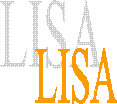| Send comments to <Uta.Grothkopf@eso.org> |
| Last modified: May 14 11:15:30 CEST 2012 |
LISA Manual
![]()
Introduction
Library and Information Services in Astronomy (LISA) is a series of scientific meetings for librarians and scientists that aims to provide a platform to discuss the state of the art of information maintenance, retrieval, delivery, and preservation and to learn from invited experts the directions in which our profession is moving. LISA conferences cover such diverse topics as organization and management of books, journals, and specialized materials; electronic publishing (note that astronomy is a leader in the field); bibliographic and full text databases of astronomical literature; reports on collaborative projects.
Between 1988 and 2006, five LISA conferences were held:
- LISA I: July 1988, Washington DC, USA
- LISA II: May 1995, Munich, Germany
- LISA III: May 1998, Tenerife, Canary Islands, Spain
- LISA IV: July 2002, Prague, Czech Republic
- LISA V: June 2006, Cambridge, MA, USA
These are all locations with active and respected astronomical institutions.
Typical attendants of LISA conferences are astronomy librarians, persons in charge of small departmental libraries, astronomers with an interest in libraries, computer scientists working with large data sets, either bibliographic or scientific, and publishers of professional astronomy journals. Generally speaking, the target audience is quite small: probably less than 400 librarians and interested astronomers world-wide. LISA conferences are usually attended by 100-120 participants.
Not all participants are professional librarians, and many of them have never attended an international professional conference. However, a strong network exists among astronomy librarians which can diminish the barrier some reluctant attendees may feel.
Organizers of LISA conferences have always aimed at attracting attendees from a large variety of countries because an international range of participants widens the scope and value of the conference. However, it also brings special problems/considerations:
resources / funding must be available to individuals to attend (in particular those from resource-poor countries)
visa-related problems may arise
as English is the conference language, non-native English speakers may have limited capabilities in terms of administrative procedures (e.g. registering), comprehension of distributed information, manuscript preparation and submission for the proceedings and social interactions. Conference organizers must always be alert for indications that people are having language difficulties (see also SOC: Special consideration: conference language).
- organizers and administrators can be located geographically far apart from each other. In order to nevertheless guarantee a successful meeting, communication (mostly by e-mail) among the organizers must work extremely well.
Organizing a LISA conference is a lot of fun and a great experience. Don't be intimidated by all the details that require attention. This manual has been compiled by previous LISA organizers. It contains lessons learned -- sometimes the hard way, when things didn't work the way we intended them to, and sometimes through success. It is long and detailed because we tried to be comprehensive in order to make it easier for future organizers and to help them avoid some mistakes we made.
The following sections are covered:
- Preliminary Organizing Committee (POC)
- Scientific Organizing Committee (SOC)
- Local Organizing Committee (LOC)
- Friends of LISA (FOL)
- Conference location
- Funding
- Publicity
- Conference program
- Proceedings
These topics are listed in the index bar on the left-hand side and can be accessed from every page. The section New Ideas provides some suggestions for future organizers which we think are worthwhile trying. However, they have never been realized, so we don't know whether or not they will work.
Each section starts with a brief overview, e.g. the main tasks of a committee or the most important issues to consider, and then provides more detailed information on the individual topics. Specific sample documents are provided throughout the sections they refer to, more general documents can be found at the end of each chapter. If issues are handled by two or more committees cooperatively, links across the manual are available. For SOC and LOC, checklists are provided; they were derived from experience gained during previous conferences and hopefully will help committees to get an overview of (and adhere to) timelines.
It was a pleasure to compile this manual, and we do hope that it will be of help to future organizers. If you are among them, please don't forget to update these guidelines after the meeting (via e-mail to esolib@eso.org, see also Updates) by adding your experiences, expertise and suggestions for improvement.
Related documents:
LISA IV concluding remarks on "LISA Meetings, Past and Present" by Brenda Corbin, 2003
LISA II Scientific rationale and draft program, submitted to IAU
version 1.0, April 2004
version 1.1, October 2004
version 1.2, April 2006 (LISA V sample docs and ADA note added (LOC)
